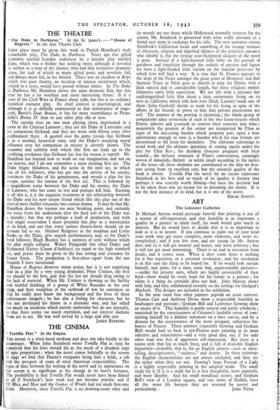THE THEATRE
"The Duke in Darkness." At the St. James's.— " House of Regrets." At the Arts Theatre Club.
Film place must be given this week to Patrick Hamilton's truly remarkable play, The Duke in Darkness. Years ago this gifted dramatist startled London audiences by a murder play entitled Rope, which was a thriller' but nothing more, although it revealed its author as a man of the theatre, who had that instinctive dramatic
sense, for lack of which so many gifted poets and novelists fail, and always must fail, in the theatre. There was an incident in Rope which was pure theatre, an incident of intense excitement which, related in a story, would have passed without notice. In The Duke in Darkness Mr. Hamilton shows the same dramatic flair, but this time he has a far worthier and more interesting theme. It is a story of the Civil Wars in France about 1580, but this is no ordinary historical costume play. Its chief interest is psychological, and although it is as skilfully constructed as that masterpiece of stage- craft, Barrie's Dear Brutus, it has far more resemblance to Piran- dello's Henry IV than .to any other play old or new.
The curtain rises on two men playing chess, imprisoned in a room in the Chateau Lamorre - they are the Duke of Latteraine and his companion Gribaud, and they are worn with fifteen years close confinement there. A quarrel over the game reveals that Gribaud is in a morbid, hysterical state, and the Duke's steadying moral influence over his companion in misery is cleverly shown. The economy and subtlety with which this first act leads up to the terrifying revelation that Gribaud has lost his reason is superb. Mr. Hamilton has learned how to work on our imagination and not on our nerves, and I do not remember a more exciting imagination, act. The Duke feigns blindness, and the scene in the next act, in which one of his followers, who has got into the service of his enemy, convinces the Duke of his genuineness, and reveals a plan for his escape, sustains the tension of the first act. This is followed by a magnificent scene between the Duke and his enemy, the Duke of Lamorre, who has come to test and perhaps kill him. Exciting as all this is, it is the exquisite treatment of the relationship between the Duke and his now insane friend which lifts this play out of the class of mere thriller virtuosity into serious drama. It may be that Mr. Hamilton draws the tension too near breaking point, and certainly the voice from the auditorium after the final exit of the Duke was a mistake ; but that was perhaps a fault of .production, and with that single reservation I must proclaim this play as a masterpiece of its kind, and one that every serious theatre-lover should on no account fail to see. Michael Redgrave as the madman and Leslie Banks as the Duke, give superb performances, and, as the Duke's loyal follower, Hugh Burden has a sureness of style without which the play might collapse. Walter Fitzgerald (the other Duke) and Richmond Nairne (Count d'Aublaye) are equal to the high standard set, and praise must be given to the fine setting and costumes by Ernest Stern. The production is first-class—apart from the one blemish I have mentioned.
House of Regrets deserves warm praise, but it is not surprising that in a play by a very young dramatist, Peter Ustinov, the first act should be the best, and that the last act should drag owing to the lack of material. When Mr. Ustinov is showing us the futility and wishful thinking of a group of White Russians in the year 1939, and their reception of the outbreak of war he convinces us that he really does know the background and the lives of these unfortunate emigreS • he has also a feeling for character, but he has not developed his theme in a dramatic way, and has relied too much on incidents which merely embroider but do not intensify, so that there seems too much repetition, and our interest slackens from act to act. He was well served by a large and able cast.
JAMES REDFERN.


























 Previous page
Previous page